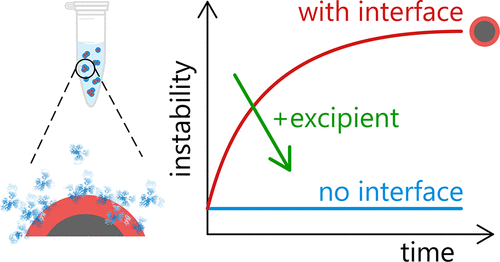当前位置:
X-MOL 学术
›
Mol. Pharmaceutics
›
论文详情
Our official English website, www.x-mol.net, welcomes your feedback! (Note: you will need to create a separate account there.)
A Nanoparticle-Based Assay To Evaluate Surface-Induced Antibody Instability.
Molecular Pharmaceutics ( IF 4.9 ) Pub Date : 2020-01-09 , DOI: 10.1021/acs.molpharmaceut.9b01168 Marie R G Kopp 1 , Umberto Capasso Palmiero 1 , Paolo Arosio 1
Molecular Pharmaceutics ( IF 4.9 ) Pub Date : 2020-01-09 , DOI: 10.1021/acs.molpharmaceut.9b01168 Marie R G Kopp 1 , Umberto Capasso Palmiero 1 , Paolo Arosio 1
Affiliation

|
Protein stability against aggregation represents a major quality attribute for the successful development of biopharmaceuticals. Increasing evidence indicates that the formation of protein aggregates in aqueous solutions is often triggered by interactions between proteins and interfaces. Yet, in contrast to a large number of methods available to test protein bulk properties, high-throughput assays to investigate protein instability at interfaces remain much less developed. Major challenges include the control of the amount and type of surfaces, as well as the presence of synergistic effects between interfaces and hydrodynamic flows. Here, we describe and develop a highly controlled surface-mediated stress assay of protein instability based on polymeric nanoparticles. We show that hydrophobic nanoparticles are remarkably powerful in destabilizing large proteins such as antibodies. We further show that this approach can be implemented on a high-throughput microfluidic platform by compartmentalizing the protein solution in picoliter droplets surrounded by an oil phase. Our method allows the evaluation of protein instability at hydrophobic interfaces in a time scale of minutes and requires amounts of the sample in the order of a few hundred micrograms. We demonstrate that our assay represents a good mimic of air-water interfaces and finds application as a screening tool to optimize protein stability toward surface-induced aggregation. We provide a concrete example by identifying the optimal concentration range of Tween 80 that prevents antibody instability in the presence of interfaces. Overall, our hydrophobic nanoparticle surface-mediated stress assay (HNSSA) represents an attractive tool for accelerated tests of protein instability at interfaces under both stagnant and flow conditions, with implications for the optimization of buffer composition and the selection of stable biotherapeutic candidate molecules during early stage development.
中文翻译:

基于纳米粒子的分析,以评估表面诱导的抗体的不稳定性。
抗聚集的蛋白质稳定性代表了生物药物成功开发的主要质量属性。越来越多的证据表明,水溶液中蛋白质聚集体的形成通常是由蛋白质与界面之间的相互作用触发的。然而,与大量可用来测试蛋白质体积特性的方法相比,用于研究界面处蛋白质不稳定性的高通量检测方法仍然远远不够。主要挑战包括控制表面的数量和类型,以及界面和流体动力流之间是否存在协同效应。在这里,我们描述并开发了一种基于聚合物纳米粒子的高度可控的蛋白质不稳定性表面介导的应力测定方法。我们表明,疏水性纳米粒子在稳定大蛋白质(例如抗体)方面非常强大。我们进一步表明,该方法可以在高通量微流控平台上通过将蛋白溶液分隔在被油相包围的微微升液滴中来实现。我们的方法可以在几分钟的时间内评估疏水界面处的蛋白质不稳定性,并且需要的样品量为几百微克。我们证明了我们的测定方法代表了空气-水界面的良好模拟,并发现其作为筛选工具可优化蛋白质对表面诱导聚集的稳定性。我们通过确定Tween 80的最佳浓度范围来提供一个具体的例子,该浓度范围可防止存在界面时抗体的不稳定。总体,
更新日期:2020-01-27
中文翻译:

基于纳米粒子的分析,以评估表面诱导的抗体的不稳定性。
抗聚集的蛋白质稳定性代表了生物药物成功开发的主要质量属性。越来越多的证据表明,水溶液中蛋白质聚集体的形成通常是由蛋白质与界面之间的相互作用触发的。然而,与大量可用来测试蛋白质体积特性的方法相比,用于研究界面处蛋白质不稳定性的高通量检测方法仍然远远不够。主要挑战包括控制表面的数量和类型,以及界面和流体动力流之间是否存在协同效应。在这里,我们描述并开发了一种基于聚合物纳米粒子的高度可控的蛋白质不稳定性表面介导的应力测定方法。我们表明,疏水性纳米粒子在稳定大蛋白质(例如抗体)方面非常强大。我们进一步表明,该方法可以在高通量微流控平台上通过将蛋白溶液分隔在被油相包围的微微升液滴中来实现。我们的方法可以在几分钟的时间内评估疏水界面处的蛋白质不稳定性,并且需要的样品量为几百微克。我们证明了我们的测定方法代表了空气-水界面的良好模拟,并发现其作为筛选工具可优化蛋白质对表面诱导聚集的稳定性。我们通过确定Tween 80的最佳浓度范围来提供一个具体的例子,该浓度范围可防止存在界面时抗体的不稳定。总体,



























 京公网安备 11010802027423号
京公网安备 11010802027423号